STREAM Activity: National Friendship Day Bracelet
Create a friendship bracelet for you and your friends!
Activity best for children ages 2 and up
Have you ever taken a closer look at the clothes that you wear? Clothes are made of fabric like yarn or cloth but how do they stay together to be worn? When we make fabric or clothes, we use the process of weaving, which is when two or more sets of thread are interlaced and connected together to form fabric or an accessory. Not only can we weave clothes like shirts or pants but we can also weave accessories like bracelets or scarves. Weaving is a process that is related to patterns, which is when a design or step repeats. When weaving, we repeat steps that connect the threads together in a pattern to form fabric. Today, we will be practicing this unique skill and will be weaving our own Paper Bracelet. We will be using pattern-like steps to weave the actual bracelet and also create decorative designs for our bracelet.
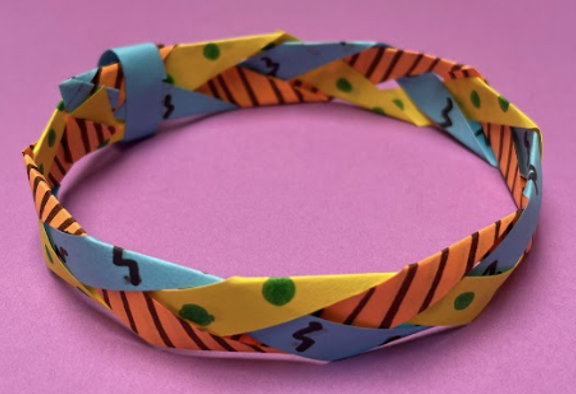
Materials:
Paper
Scissors
Glue
Coloring materials (optional)
Guiding Questions:
Do you see design patterns on any of your clothes?
Can you find any clothes you own that were weaved?
Directions
Step 1
Measure 1 cm thickness from the bottom of the paper and draw a line from one end to the other. Next, cut the strips out. You will need a total of 6 strips.
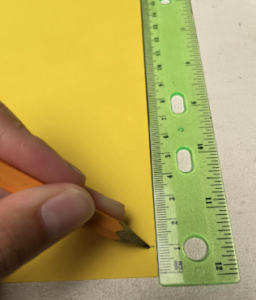
Step 2
Glue together 2 strips and measure 35cm once combined. You can trim it off if it’s too long.
Be sure to make a total of 3 strips at 35cm long or any length you like. Be sure all 3 strips are the same length.
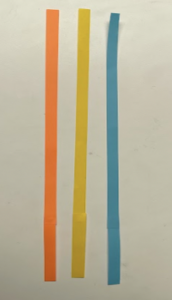
Step 3
Decorate and color your strips. You can also add different colors and patterns.
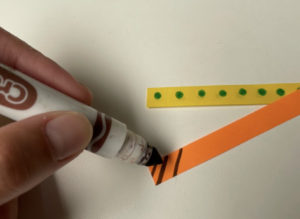
Step 4
Place some glue on one end of your first strip. Next, add your second strip to make an L-shape. Lastly, add your third strip diagonally in between your L-shape so far.
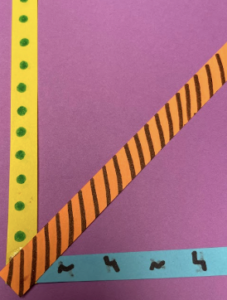
Step 5
Trim the extra edges off.
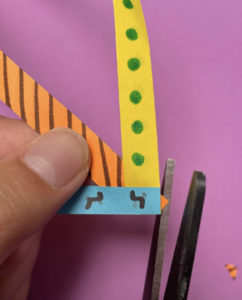
Step 6
Fold one of the outer strips over the middle strip and align it with the opposite side’s.
In this example, the outer yellow strip was folded over the orange strip and aligned to the blue strip.
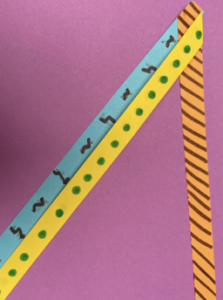
Step 7
Fold the strip beside the first one you folded over. Then bring the middle strip over and align it.
The blue strip that was beside our first yellow strip was folded over. Then the middle orange strip was brought over the blue one and was aligned with the yellow strip.
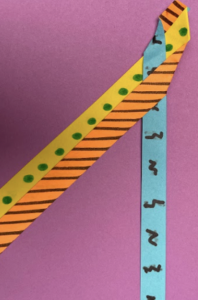
Step 8
Continue folding over strips aligned with each other one at a time and continue the pattern. Continue on until the strips are too short to fold over and the end of the bracelet is reached.
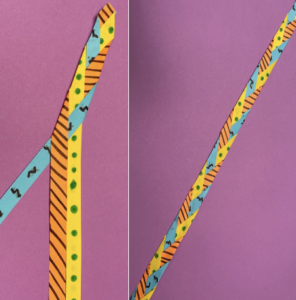
Step 9
Add glue to the end of your bracelet and fold it over once. This is to secure the end of the bracelet and to stop the paper strips from slipping out.
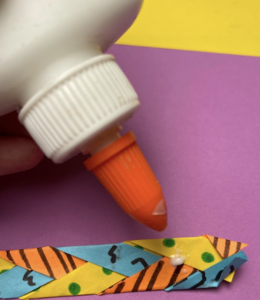
Step 10
Cut a strip or paper 3 cm long and 1 cm wide and attach it to the end of the bracelet with glue. Wrap it around and connect it together. This will be our bracelet fastener.
Once you complete this step, your bracelet is complete!
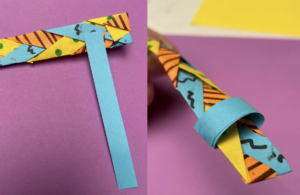
Grown Ups-Are you looking for more ways to extend your child’s learning? Check out these extension activities to build upon today’s STREAM activity!
Reading Connections
Patterns Everywhere by Nora Gaydos
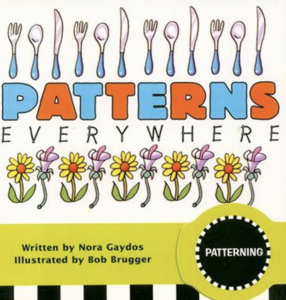
Math Connections
Number patterns are extremely important and useful in the world of math. Patterns can give us information, help us count quicker or help us solve problems.
Real-World Connections
Weaving is a process founded on pattern-like steps. There are many other processes created that were inspired by patterns, like using sound patterns to create music or color patterns in creating art.
Share your friendship bracelet with us on Instagram by tagging @sdcdm320!
Questions about this activity? Email education@sdcdm.org

